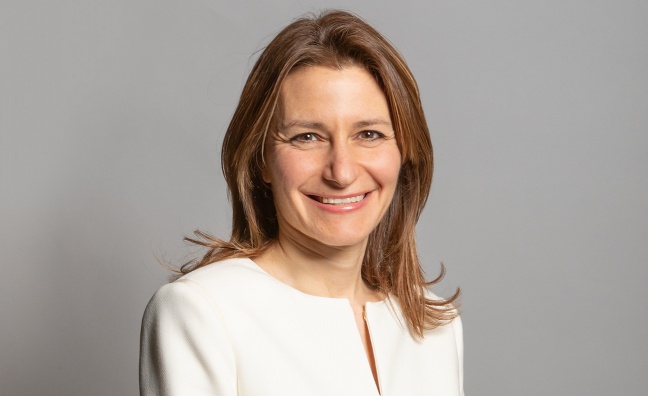The future of artificial intelligence in film, music and television will be discussed today (November 20) at a roundtable led by Culture Secretary Lucy Frazer (pictured) and attended by key figures in the creative industries.
Senior bosses from the UK’s creative sectors will join representatives from the Intellectual Property Office and Creators’ Rights Alliance to explore the opportunities and challenges AI presents to creative industries.
The CEOs of the UK’s three major labels – Universal Music’s David Joseph, Sony Music’s Jason Iley and Warner Music’s Tony Harlow – will all be attending the roundtable.
The roundtable will cover concerns about copyrighted material being used without permission to train AI models like ChatGPT, and the risk that content created by AI can potentially infringe creative intellectual property.
The meeting is also expected to cover the necessary protections for artists’ likenesses and voices.
It follows the latest update from YouTube on measures to allow rights-holders to request music content that mimics artists to be taken down. However, the platform is also experimenting – in partnership with artists and labels – on allowing creators to clone certain artists’ voices on YouTube Shorts.
The conversations will also consider how AI can be used positively to achieve the goals set out in the government’s Creative Industries Sector Vision to boost these industries by £50 billion, create one million extra jobs, and build a pipeline of future talent by 2030.
Creatives rightly have concerns - and proposals - about how their work is used by artificial intelligence now and in the future, and I want to hear them
Lucy Frazer
“Further AI adoption can allow artists to perform in new ways, like ABBA Voyage which brings together avatars and a live band,” said a statement from the Department for Culture, Media & Sport. “AI can also streamline experimentation, generating new edits of songs or footage in minutes which would usually take creators hours. Increasing creativity and productivity can drive further growth in these industries, which contribute £108 billion to the economy annually.”
Culture Secretary Lucy Frazer said: “The UK’s strengths and accomplishments in art and entertainment mean we are well placed to take advantage of developing technologies in this field. But creatives rightly have concerns - and proposals - about how their work is used by artificial intelligence now and in the future, and I want to hear them.
“As Culture Secretary I want to maximise the potential of our creative industries and grow them by £50 billion by 2030, creating one million new jobs. I believe that AI can help with delivering these goals, but only if opportunities are developed responsibly and in lock-step with industry, which is the ambition behind today’s meeting.”
The meetings follow the publication of the AI Regulation White Paper, which set out the UK’s ‘pro-innovation approach’ for the regulation of AI. It is part of a wider sector engagement plan for the government to understand how this technology impacts different industries.
The meetings will cover the Intellectual Property Office’s work to develop a new code of practice, aiming to ensure appropriate protections for copyright material while making content licences to develop AI models more available.
Earlier this month, BPI CEO Dr Jo Twist attended a pre-summit business roundtable as part of the government’s AI Safety Summit.
Invitees to the roundtables with Culture Secretary Lucy Frazer
David Joseph, CEO & chairman, Universal Music UK
Jason Iley, CEO & chairman, Sony Music UK
Tony Harlow, CEO, Warner Music UK
William Sargent CEO, Framestore Group
Dan Guthrie, Director General, Alliance for IP
Nicola Soloman CEO, Society for Authors and Chair, Creators’ Rights Alliance
Chris Mills, Director of Rights Policy and Enforcement, Intellectual Property Office
Dan Conway, CEO, Publishers’ Association
Jonathan Lockwood, VP Corporate Counsel, Getty Images
Nina Schick, Author, Deepfakes: the Coming Infocalypse











